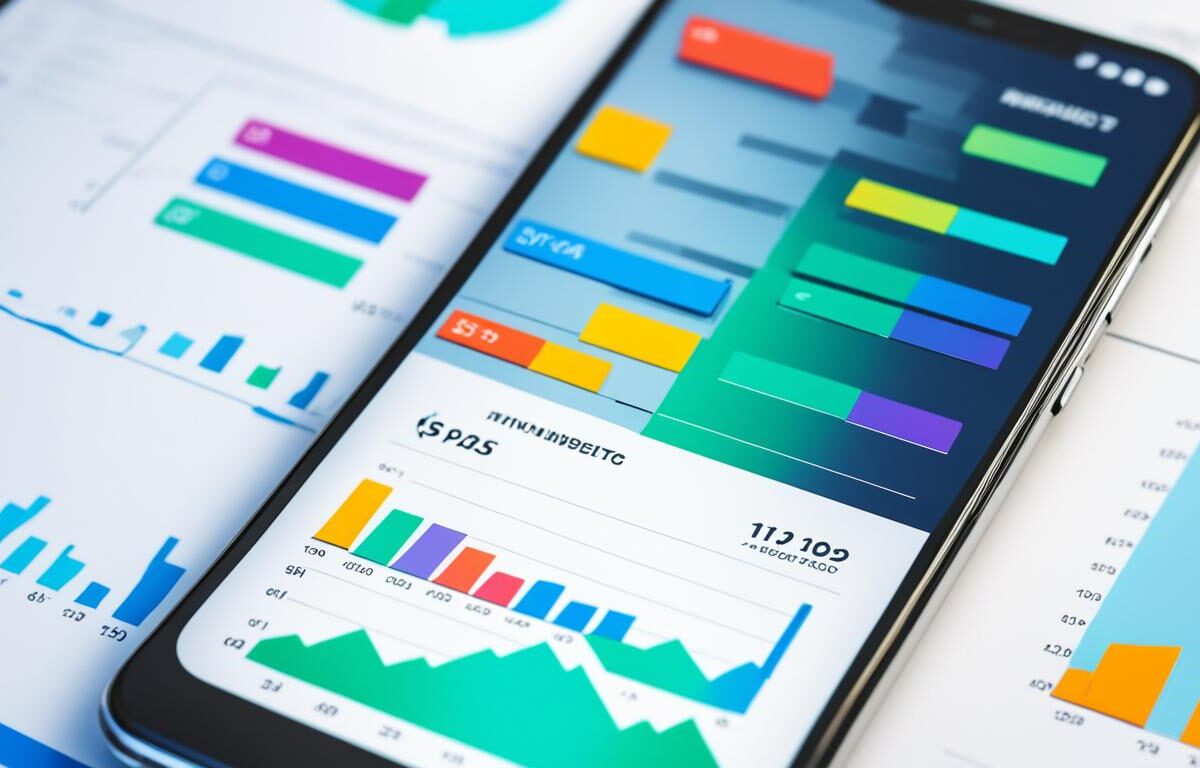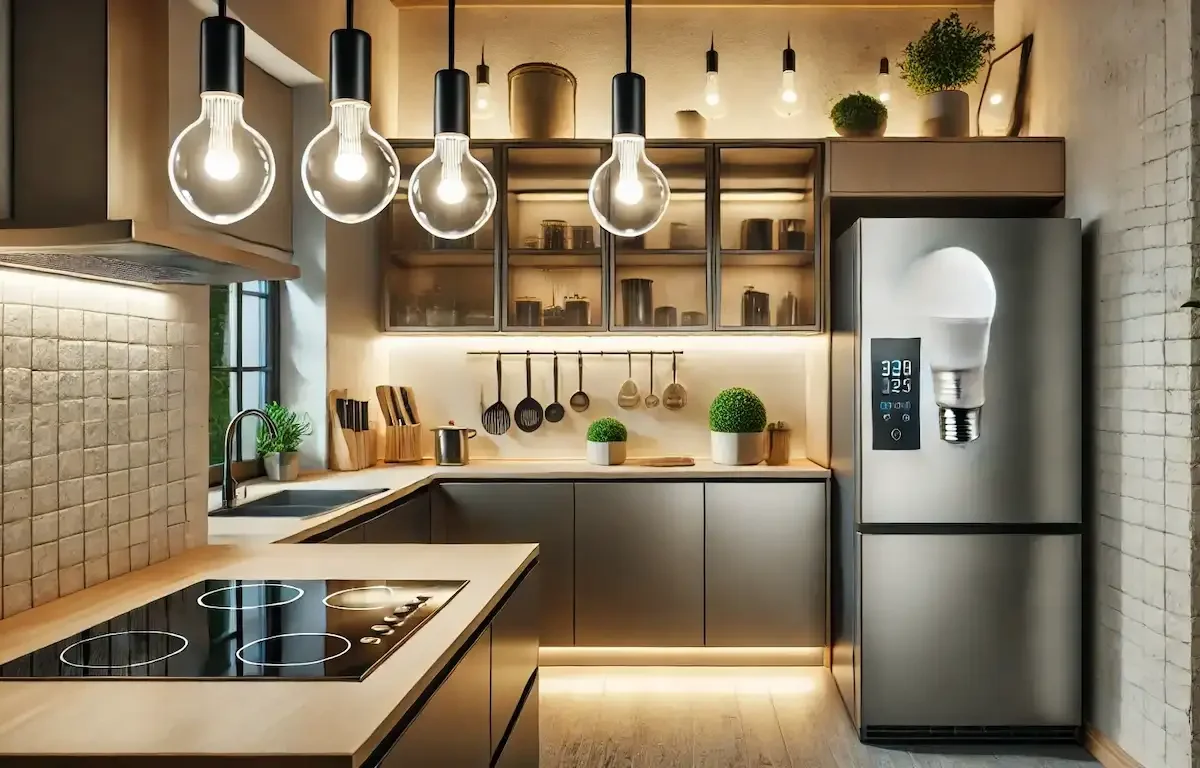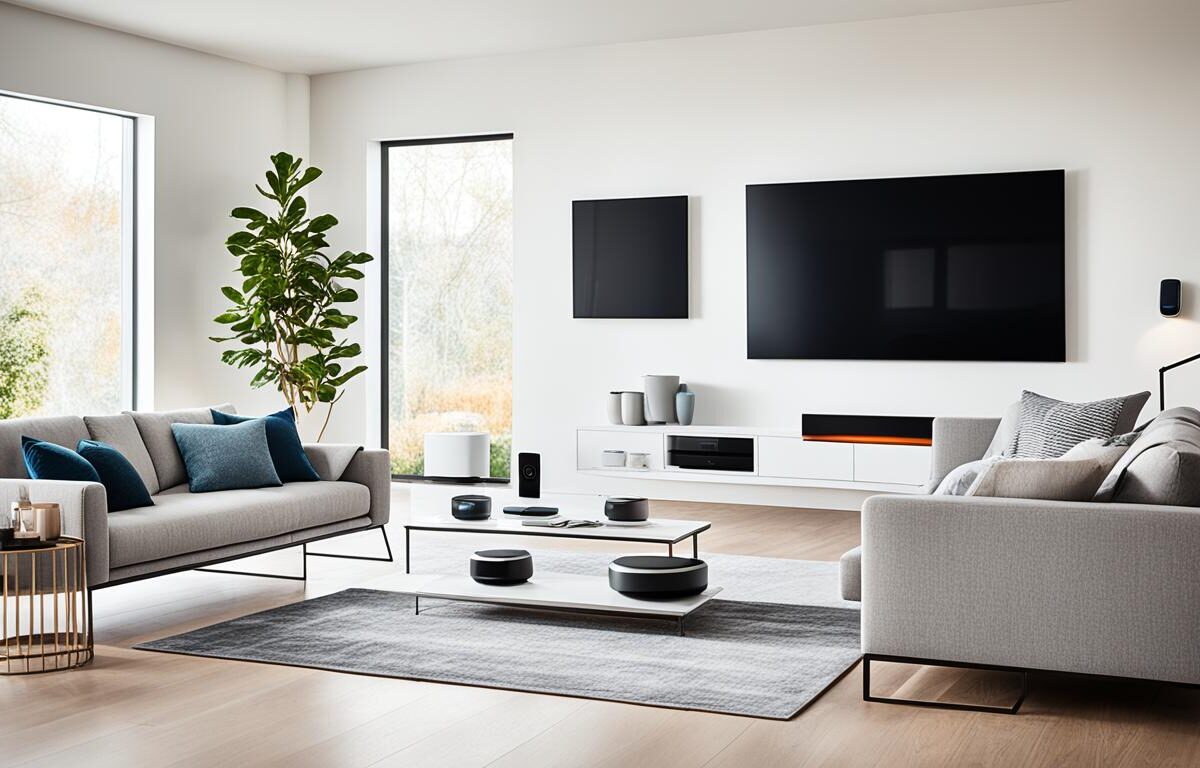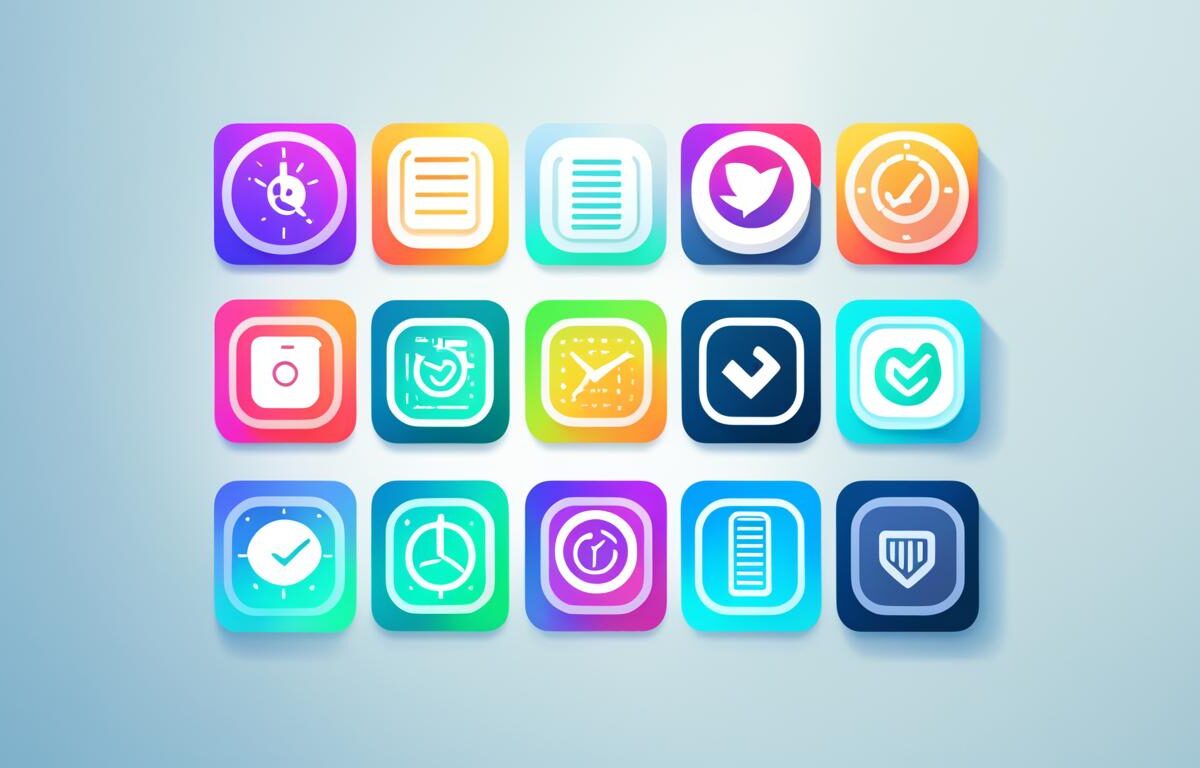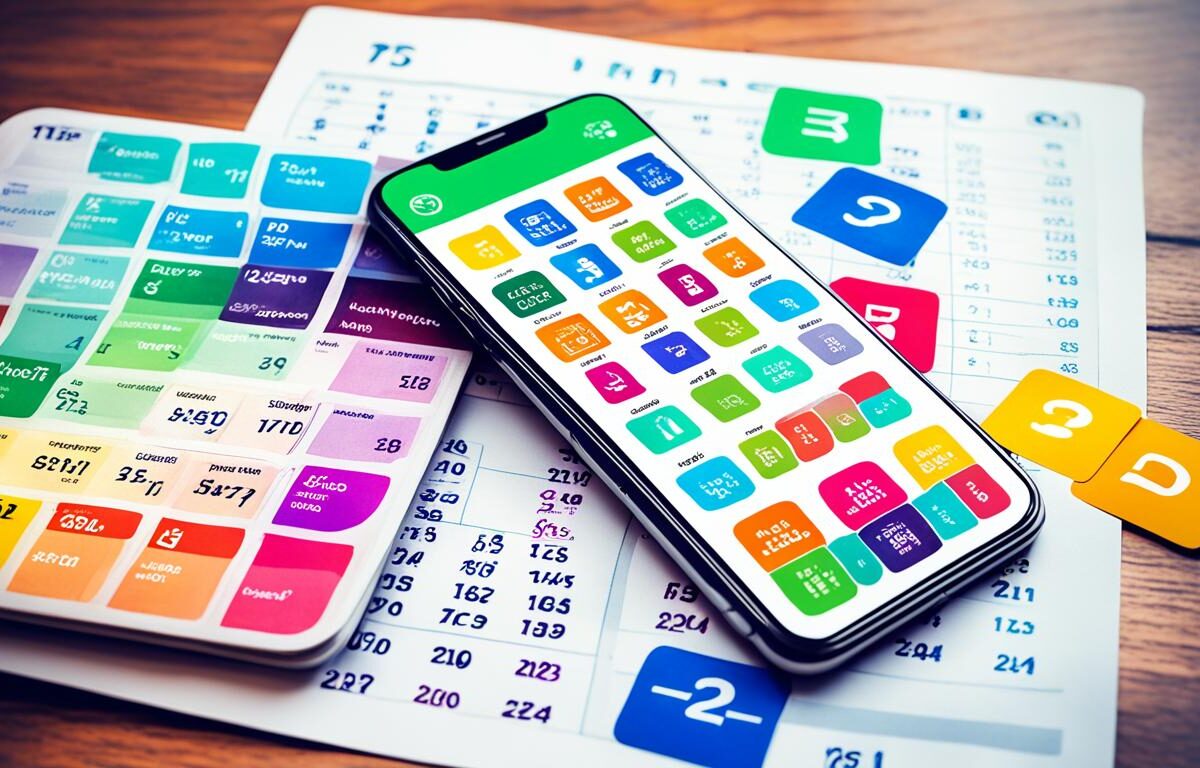I’ve struggled with sleep for a long time, feeling tired and unrefreshed. That’s why sleep tracking tech has changed everything for me and many others. These devices, whether on our wrists or under our mattresses, can reveal the secrets of our sleep. They help us get the restful nights we need.
Key Takeaways
- More than a third of Americans have used a device to monitor their sleep.
- 77% of sleep tracker users found the device helpful in improving their sleep.
- Sleep tracking devices can provide valuable insights into sleep patterns and habits.
- Sleep trackers can help users identify and address sleep disturbances.
- Consulting a doctor is still recommended for more severe sleep issues like sleep apnea or chronic insomnia.
The Rise of Sleep Tracking Technology
Sleep is now seen as key to our health and happiness. This has led to a big increase in the use of sleep tracking devices. Now, there are many options like wearable, bedside, and mattress-based monitors for tracking sleep.
Wearable Sleep Trackers
Wearable devices like rings, watches, and bracelets are popular for tracking sleep. They use tech like photoplethysmography (PPG) and motion sensors. These devices track sleep stages, quality, and other important details. With over 650 studies on Fitbit devices, their accuracy is a focus of ongoing research.
Bedside and Mattress Sleep Trackers
Bedside and mattress-based sleep trackers are also gaining fans. They use tech like motion sensors and pressure pads. They track sleep patterns without needing to wear anything. While polysomnography (PSG) is the top method for sleep tracking, these devices offer a simpler way to understand sleep habits.
| Sleep Tracking Technology | Key Features | Accuracy Considerations |
|---|---|---|
| Wearable Trackers |
|
|
| Bedside and Mattress Trackers |
|
|
![]()
The market for sleep tracking devices is booming. A 2023 survey by the American Academy of Sleep Medicine found 35% of Americans use sleep-tracking devices. Of those who tried them, 77% found them useful. Also, 68% changed their sleep habits based on the insights from these devices.
How Sleep Trackers Work
Sleep trackers are now widely used, with millions tracking their sleep to monitor health. These devices use sensors and techniques to collect data on our sleep. They show how long we sleep, its quality, and our sleep patterns.
Measuring Sleep Duration and Quality
Many sleep trackers use photoplethysmography (PPG) to track heart rate and blood volume changes. This helps figure out the different sleep stages. Accelerometers and gyroscopes also help by tracking movement and position. Some even monitor light, sound, and temperature to see how they affect our sleep.
Tracking Sleep Stages and Patterns
A sleep cycle has light sleep, deep sleep, and REM sleep, repeating every 90 to 110 minutes. Sleep trackers give useful insights, but they don’t directly measure sleep. They’re not always accurate in tracking sleep stages. More precise methods, like brain wave studies, give better sleep pattern data.
Still, sleep trackers help us see our sleep habits. They show how bedtime, room temperature, exercise, and caffeine affect our sleep quality. The info is easy to understand, shown in graphs and reports, helping us grasp our sleep trends.
| Feature | Description |
|---|---|
| Sleep Duration Tracking | Monitors the time spent asleep using accelerometers and movement sensors. |
| Sleep Quality Monitoring | Assesses factors like restlessness, sleep disturbances, and wakeups during the night. |
| Sleep Stage Tracking | Estimates the different stages of sleep (light, deep, and REM) using PPG and other sensors. |
| Environmental Factors | Tracks parameters like light, sound, and temperature that may impact sleep. |
Sleep trackers give useful insights, but they’re not as accurate as medical sleep studies. Yet, they’re great for promoting better sleep habits and finding ways to improve.
![]()
Benefits of Using a Sleep Tracking
Sleep tracking devices give us deep insights into our sleep habits. They help us make changes for better rest and well-being. By understanding our sleep patterns, we can improve our sleep hygiene and daily routines.
Gaining Insights into Your Sleep Habits
Sleep trackers show us our sleep cycles. They record important details like bedtime, hours slept, snoring, wake-up times, and daily habits. This info helps us spot patterns that might be affecting our sleep quality. We can then fix these issues.
Improving Sleep Hygiene and Daytime Habits
With sleep tracking insights, we can tweak our sleep and daily activities. By focusing on bedtime routines, caffeine, and daylight, we can sleep better. This leads to better sleep quality and consistency.
Studies show that many people improve their lifestyle and sleep habits with sleep trackers. Being aware of our sleep helps us take steps to get better rest. This, in turn, boosts our health and well-being.
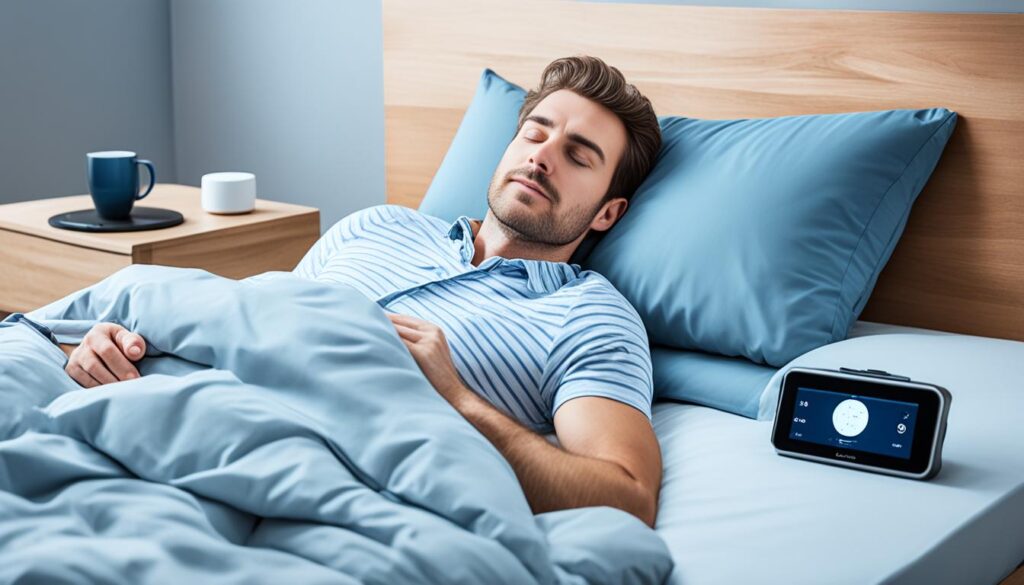
“Sleep tracking was highlighted as a tool that could provide individuals with a platform for change once they were ready to commit to improving their sleep quality.”
Sleep Tracking for Better Sleep Consistency
Sleep tracking devices do more than just show us how we sleep. They help us get more consistent and quality rest. Experts say it’s often more important to sleep consistently than just sleeping a lot. By finding out what disrupts our sleep and sticking to good habits, these devices can help us sleep better.
About one quarter of adults in the USA use sleep tracking apps. These apps track things like breathing, heart rate, and movement to show us how well we sleep. They give us a full picture of our sleep quality and patterns.
A study looked at the Fitbit Charge 2 and compared it to the top sleep assessment method. It found the Fitbit might overestimate sleep time. But, it showed these devices can spot big drops in sleep after big events, like in the UK and the US.
“Getting more sleep isn’t always the answer – consistent, high-quality sleep is often more important,” according to a study published in the Diabetes Journal.
These devices are also used in studies with people who have type 2 diabetes. Fitbit data matches up with what patients say about their sleep. This helps people improve their sleep patterns and sleep consistency. It also helps with their health and well-being.
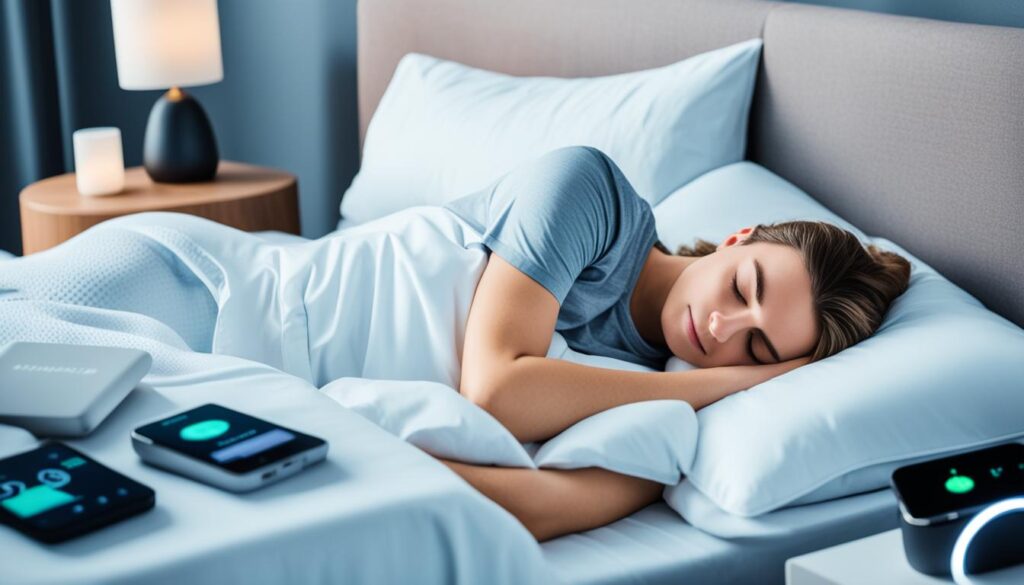
Using a sleep tracking device is a key step to better sleep consistency and quality. These tools give us data to spot what disrupts our sleep. They help us stick to good habits. This leads to the consistent, restful sleep we need for our health.
Who Should Use a Sleep Tracker?
Sleep trackers are great for people who have trouble sleeping, like those with insomnia or waking up a lot. They help find out why you’re not sleeping well. This lets you fix the problems.
They’re also good for people who care about their health and want to track their sleep. By understanding your sleep patterns, you can make better choices to sleep better and feel better overall.
Addressing Sleep Disturbances
If you can’t sleep well often, a sleep tracker can give you important info. It tracks how long you sleep, how well you sleep, and your sleep patterns. This helps you see what might be waking you up, like stress, weird sleep times, or health issues. With this info, you can change your life or get help to sleep better.
Monitoring Sleep for Wellness
For those who focus on being healthy, a sleep tracker is a good tool. It shows how your sleep affects your energy, mood, and how well you perform physically. This info helps you make changes to your sleep, exercise, and lifestyle to be your best.
But, sleep trackers might not be good for people with a lot of anxiety. The info they give can make you worry too much and keep you awake. If this happens, talk to a doctor for advice on how to handle your sleep issues.
Limitations of Sleep Tracking Devices
Sleep tracking devices have become very popular lately, but experts warn of their limits. In 2020, the market was worth over $12.5 billion and is expected to hit over $40 billion by 2027. But, many worry about how accurate and reliable these devices are.
Accuracy and Reliability Concerns
These devices track movement, noise, and heart rate to guess sleep quality and length. But, this method can be wrong, especially for those who stay still but are awake. Also, since the FDA doesn’t strictly regulate them, many haven’t been tested well.
Studies show that devices like Fitbit and Jawbone might not match up with professional sleep studies. They could overestimate or underestimate sleep patterns. The American Academy of Sleep Medicine says there’s little proof these devices accurately track sleep stages.
“Despite their limitations, sleep trackers can provide surface information and motivate users to prioritize bedtime and seek medical advice for sleep-related concerns.”
Even with their flaws, sleep trackers can be helpful for people wanting to learn about their sleep. Experts suggest using them with other healthy habits like a regular sleep schedule, exercise, and avoiding tech at bedtime.
If you’re having trouble sleeping or feel very tired during the day, see a doctor. Don’t rely solely on sleep trackers to make sleep decisions. They should help support your sleep health, not replace it.
![]()
Sleep Tracking and Sleep Disorders
Sleep tracking devices are now widely used to monitor sleep patterns and quality. They offer valuable insights but have limits in identifying and managing sleep disorders.
These devices can spot issues like sleep apnea, a condition where breathing stops during sleep. They track breathing patterns and oxygen levels. This might show signs that need a doctor’s check-up. But, they’re not a replacement for a professional sleep disorder diagnosis and treatment.
Too much focus on sleep tracker data can lead to “orthosomnia.” This means people worry too much about getting perfect sleep stats. It can cause problems like trouble falling asleep, waking up a lot at night, and feeling tired during the day.
Sleep trackers are seen as lifestyle or entertainment tools, not medical devices. Their data might not be as precise as what’s found in a detailed sleep study. This type of study checks brain activity, eye movements, muscle tension, and breathing for a full view of sleep patterns.
| Sleep Tracking for Sleep Disorders | Potential Benefits | Limitations |
|---|---|---|
| Detecting potential issues like sleep apnea | Can provide insights into breathing patterns and oxygen levels | Not a substitute for professional diagnosis and treatment |
| Monitoring sleep patterns and quality | Can help identify sleep disturbances and guide interventions | Accuracy may be inferior to polysomnography, the gold standard |
| Identifying emerging conditions like “orthosomnia” | Can raise awareness of unhealthy obsession with sleep tracking | May contribute to anxiety and disrupt natural sleep patterns |
Sleep tracking devices can be helpful for those wanting to understand their sleep better. But, it’s key to see the data in the right context. If you have ongoing sleep issues or think you might have a sleep disorder, get professional advice. Using these devices wisely can help support your sleep health and overall well-being.
![]()
Sleep Tracking for Optimizing Performance
Sleep tracking is key to better sleep and improving performance, whether at work or in sports. It shows how you sleep and helps you change your habits for better daytime performance. This includes better thinking skills and faster recovery.
By 2019, about 30% of people in the U.S. used a wearable device to track their sleep. The market for these devices is expected to hit $7 billion by 2026. This shows how important sleep tracking for performance and being productive has become.
A study with 63 participants looked at how accurate different sleep trackers were. They tested devices like the Oura Ring Gen 3, Fitbit Sense, and others. The study found that Oura and Fitbit were more accurate at tracking when you’re asleep or awake.
But, the study also noted that these trackers weren’t as good at tracking sleep for people who didn’t sleep well. Oura and Fitbit still worked well even when bedtime wasn’t ideal or if you had some sleep issues.
In short, sleep tracking is a great way to improve your performance. It gives you insights into your sleep habits. This lets you make changes to get better sleep, which helps with thinking, recovering, and feeling good overall.
Interpreting Sleep Tracking Data
Sleep tracking tech is getting better, but knowing how to use the data it gives is key. Experts warn not to get too caught up in trying for “perfect” sleep. Sleep metrics can give us useful info, but we shouldn’t obsess over them.
Understanding Sleep Metrics
Sleep trackers show things like how long you sleep, the sleep stages (light, deep, and REM), and how good your sleep is. It’s key to know what these metrics mean and their limits:
- Light sleep usually takes up 50-60% of sleep time, deep sleep 10-25%, and REM sleep 20-25%.
- Age, health issues, and some medicines can change how sleep stages happen.
- Sleep cycles are about 90 minutes long and change between stages all night.
- Everyone needs different amounts of sleep, and what works for you is what matters most.
Avoiding Obsession with Data
Sleep tracking data is useful, but don’t get too caught up in perfect sleep numbers. This can make you more anxious and hurt your health. Instead, use the data to slowly get better at sleeping and taking care of yourself.
The aim of sleep tracking is to learn things that help you make good changes. Don’t let the numbers take over your life. Keep things in balance to use sleep tracking to your advantage without getting too caught up.
Choosing the Right Sleep Tracker
When picking the best sleep tracking device, think about its features, accuracy, and how it fits with your health apps. The right sleep tracker can greatly help you understand and better your sleep quality.
Price is a big factor. Devices range from the $70 Rise Science Sleep Tracker to the $445 Muse S Headband. While pricier options offer more features, make sure they match your sleep goals and needs. For instance, the Oura Ring costs between $300 and $450 but is worth it for many users because of its detailed sleep and health tracking.
Comfort and functionality are also key. Devices come as watches, wristbands, rings, headbands, and eye masks. They can track heart rate, heart rate variability, respiration, and body temperature. Smart alarms and battery life also matter a lot for the user experience.
To pick the right one, look into top sleep tracking devices and compare them. Read reviews and get advice from trusted sources to find the best sleep tracker for you. Think about what you need and choose a device that offers the insights to improve your sleep and health.
“Investing in the right sleep tracking device can be a game-changer in understanding and optimizing your sleep patterns.”
Conclusion
Sleep tracking technologies are now key for those wanting to improve their sleep and health. They give users deep insights into their sleep habits and quality. This helps people make smart changes to their sleep habits.
These devices help with better sleep consistency, improve daytime activities, and boost physical and mental health. Many users have seen these benefits.
But, these technologies have limits and shouldn’t replace doctor’s advice. They can be a great addition to a full sleep health plan. By knowing the good and bad of sleep tracking, people can use these tools to reach their sleep goals and better their health.
As more people start using sleep tracking, we expect to see more progress in this area. This will lead to better sleep quality for those using these technologies.
The rise of sleep tracking devices could change how we manage our sleep. This could lead to a healthier, more rested, and productive society. As we delve deeper into how technology affects sleep and health, sleep tracking insights become more valuable. They help us aim for the best rest and wellness.

